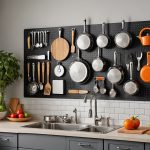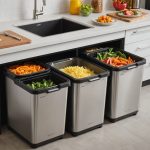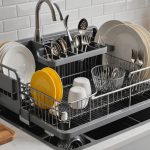Benefits of Smart Waste Sorting Systems in the Culinary Space
In the culinary space, smart waste sorting systems can be a game-changer, significantly transforming how we approach healthier eating habits and kitchen organization. When we sort waste efficiently, it not only transforms kitchen dynamics but also contributes to healthier meal preparation. By recognizing and separating organic waste, it becomes easier to focus on fresh, nutritious ingredients, ultimately fostering healthier meal choices.
One of the pivotal benefits lies in their environmental impact. These systems substantially reduce food waste, allowing for a more eco-friendly kitchen environment. By efficiently sorting organic and recyclable materials, we can decrease the volume of discarded food, thus mitigating environmental harm.
Incorporating organized waste sorting solutions directly influences nutritional choices. Amidst the hustle and bustle of meal prep, a strategically organized kitchen keeps healthy options at the forefront. By ensuring that waste is properly sorted, it reduces clutter and enhances access to nutritious ingredients. Consequently, this positively impacts dietary habits by promoting conscious and healthy eating decisions. Thus, the connection between a well-organized waste system and better nutritional choices becomes undeniably evident. Making the switch to such systems signifies a stride towards an organized and health-conscious kitchen.
Implementing a Smart Waste Sorting System
Incorporating a smart waste sorting system in your kitchen significantly boosts kitchen efficiency and aligns with eco-friendly practices. Taking a systematic approach to waste sorting encourages environmentally conscious behaviour while streamlining your meal preparation process.
Have you seen this : Revamp your kitchen: maximize storage and inspire healthy cooking with an innovative pegboard system
Assessing Your Current Kitchen Setup
Begin by evaluating your existing kitchen setup. This involves identifying current waste disposal habits and understanding how they affect your kitchen’s efficiency. Acknowledge where clutter impedes efficiency and recognize which sections of your kitchen can be optimized. Assessing the flow of waste helps to pinpoint inefficiencies and sets the groundwork for more organised waste management.
Selecting the Right Waste Sorting System
Choosing the right waste sorting system is crucial. Look for systems that offer separate compartments for different types of waste, such as recyclables and compostables. Consider factors like size, accessibility, and ease of use for all household members. Selecting containers that blend functionality and aesthetics can enhance the kitchen’s appeal and serve practical purposes, ensuring a seamless integration into your culinary space.
Step-by-Step Implementation Guide
Integrate your chosen system into daily routines with practical steps:
- Start with an audit of daily waste generation.
- Identify high-waste areas and adjust your sorting system accordingly.
- Regularly monitor and adapt the system to continuously optimize kitchen efficiency.
Organizing Your Kitchen for Better Eating Habits
Designing a well-organized kitchen can promote healthier eating habits and effective food management. Implementing strategic kitchen organization tips can greatly enhance meal prep strategies, reducing food waste and ensuring seamless culinary experiences.
Start by efficiently storing food to minimize waste. Use transparent containers for easy identification and tracking of produce, proteins, and grains. Group similar items together, ensuring fresh ingredients remain visible and accessible. This not only curtails clutter but encourages the preparation of balanced meals.
Next, integrate dedicated zones for meal prep. Establish a clear station for chopping, mixing, and plating. Organised workspaces streamline the cooking process, making healthy meal preparation more enticing and manageable.
Lastly, create a designated area for smart waste sorting. Position bins or compartments near meal prep areas, facilitating swift disposal of recyclables and compostables. A convenient sorting setup aids in maintaining kitchen cleanliness and fosters a sustainable kitchen environment.
These approaches advocate for a proactive and thoughtful culinary space, enhancing the ease and pleasure of preparing nutritious meals, and aligning with eco-friendly practices to bolster kitchen waste management.
Product Recommendations for Waste Sorting
Implementing a smart waste sorting system can significantly enhance your kitchen’s eco-friendliness and efficiency. Explore these key product categories to find the best tools suited for your needs.
Top Smart Waste Bins
Investing in high-tech waste bins with integrated sorting features can simplify your waste management routine. Look for bins with automated sensors that open and close lids, separating recyclables from compostables seamlessly. Brands offering multi-compartment bins streamline the sorting process and reduce handling time.
Additional Kitchen Tools for Efficiency
Complement your waste sorting system with additional kitchen tools designed for improved efficiency. Consider composting caddies that can be placed on countertops, allowing for quick disposal of organic waste while cooking. As well, explore kitchen scales that measure food portions accurately, assisting in mindful meal prep and portion control.
Budget-Friendly Options
For those seeking cost-effective solutions, alternatives such as simple labelled bins offer practicality without a large investment. Reuse existing containers by designating specific tasks, like composting or recycling. This not only supports eco-friendly habits but also encourages creativity in managing kitchen waste effectively.
By selecting tools and equipment wisely, you can maximise your kitchen’s functionality while championing eco-friendly practices.
Case Studies and Testimonials
Transforming your kitchen through smart waste sorting can significantly impact both your environment and lifestyle. Let’s explore notable real-life examples and user testimonials.
Success Stories of Kitchen Transformations
One inspiring case comes from a small bistro that adopted advanced waste sorting. By integrating separate bins for recyclables and organics near prep stations, they reported a 30% reduction in food waste. This change fostered healthier eating habits by prioritising fresh, nutritious ingredients. It became a catalyst for positive changes in menu offerings, favouring seasonal produce.
Data on Waste Reduction and Improved Eating Habits
Empirical evidence highlights kitchens that implement waste sorting systems see a tangible reduction in waste output. A home study showed a consistent 15% decline in food waste, as clutter was minimized and meals became more balanced.
Testimonials from Users
Home cooks frequently express relief and satisfaction with their newly organised kitchens. One user noted, “By managing waste better, our meal prep is more efficient, and we’ve naturally shifted towards eco-friendly practices.” A chef added, “Efficient waste sorting doesn’t just clean up space; it clears the mind for focusing on culinary creativity.” These testimonials reflect transformative lifestyle changes and underscore practical benefits experienced by real users.











